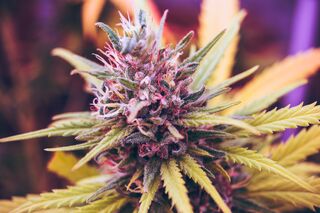Environment
Psychedelics: Can We Outperform What Nature Gives Us?
We must better understand psychedelics in order achieve even greater heights.
Posted August 19, 2021 Reviewed by Chloe Williams
Key points
- Naturally occurring psychedelic substances are being studied for clinical benefit and have shown a good deal of promise.
- There are dangers tied to the medicalization of psychoactive drugs, and relying only on what nature provides may be a shortcoming for the field.
- Developing interventions based on research that aims understand human functioning and naturally occurring psychedelics may lead to progress.
I grew up in an era when phrases like “just say no” loomed large and TV commercials featuring stoned drivers running over little children regularly streamed over the airwaves.

Like other children of the '80s and early '90s, I was conditioned to loathe mind-altering substances for the negative outcomes associated with their use. As an adult, I chose to study psychiatry, a field of medicine now so heavily focused on trying to milk the best properties of mind-altering drugs that many practicing psychiatrists have yielded areas like talk therapy to other professionals.
When I think about my relationship with drugs, "up with hope, down with dope" rings a certain bell for me, but it conjures the image of a scene in the pro-cannabis movie Half Baked with Dave Chappelle trying to pass himself off as someone who didn’t partake in the stuff. That movie came out in wide release in 1998, when I was a teenager and just about the time that attitudes toward many drugs were changing. The War on Drugs had become a punchline.
It only took the better part of two decades for popular opinion toward what are still illicit drugs at the federal level to swing so wildly in the opposite direction that movements across the nation sprang up to legalize and even medicalize substances like cannabis.
Proper medicalization of a substance requires work
Despite my unending adoration for the movie Half Baked, the biologically oriented psychiatrist in me has never been comfortable with the use of medical marijuana. It conveys an understanding of the drug – including all of the various chemical components – with regard to safety and efficacy for certain conditions in a manner that’s just never been well studied. I don’t blame the industry for this; for most of my life, it’s been illegal or at least very difficult to study the neurological and psychiatric effects of cannabis, so I can appreciate why we’re starting out from a bad position.
I was relieved when my state of Massachusetts made the drug legal for recreational use because then when patients anecdotally reported that they used cannabis and that it helped with their anxiety or sleep, I was able to delight with them. They had found something that helps, and that is an achievement to celebrate, but I don’t go as far as to claim understanding of how it occurred.

As medical doctors, psychiatrists need to rely upon rigorous study of the substances we prescribe or we are no better than our worst reputation – pill pushers, shills for big pharma. That stance is why I feel uneasy about the current status of psychedelics in our field.
I do think there is tremendous potential for the components that comprise substances like psilocybin and MDMA. These are psychoactive drugs that have clear effects on the brain. There is absolutely no reason we can’t harness those approaches in a rigorous, scientifically valid methodology toward better living through chemistry.
Many patients that I encounter seem particularly drawn to the potential for psilocybin as a naturally occurring substance, and I acknowledge that most of the best discoveries in medicine initially stem from better understanding nature. But we cannot stop there if we are to live up to the potential of our field and the responsibility of our calling.
We must unleash scientific progress but guard against new dangers
As we have with almost every class and category of street drug, we have the potential to perform good translational science with these drugs and bring them into the system with optimized safety and efficacy as has already begun [1,2,3]. This is no small task, and it requires good faith effort and humility to know that our creations can go awry.
Recall, of course, that the clinical power buried in the substance of a poppy plant was unleashed to free millions from pain and condemned countless others to addiction, an epidemic of overdoses, and unnecessary deaths. Similarly, our understanding of the neurodepressant effects of alcohol on the brain’s GABA receptors helped us to develop a range of benzodiazepines that alleviate anxiety for millions of people. Still, they are also used as drugs of abuse by many, and this is not a benign issue. Similarly, the study and investigation of naturally occurring stimulants led to the development of life-changing medications for attention-deficit/hyperactivity disorder (ADHD), but those factory-produced pharmaceutical-grade pills also get diverted to college campuses and even high schools for cognitive performance enhancement in the young and healthy.
Where we currently stand with psychedelics in psychiatry is a dangerous spot overlooking a promised land of evidenced-based psychopharmacology beyond a chasm of pseudoscientific regret.

Reputable scholars are studying the underlying properties of substances like psilocybin, and I am thankful that research institutes at academic locations like Harvard Medical School, Johns Hopkins, and Yale are arising to illuminate nature’s secrets. Across the academic landscape, there were 17 clinical trials in the area of psychedelics in 2020 alone and we are on pace to eclipse that number this year [4]. The targets of these trials are complex disorders like major depression, posttraumatic stress disorder, and addiction. If the scholarly pursuit of applying these drugs to those conditions does not engage the scientific apparatus of discovery and enhancement, I believe the efforts will fail.
We must learn from what occurs in nature so that we can surpass it
Psychedelics alone will not solve these problems, but medications derived from the study of these substances may succeed. In the coming years, as psychedelics begin to divulge the almost supernatural effects from their natural origins, my hope is that the field will be brave enough to fulfill our duty and offer interventions that are both safe and effective as proven by the rigors of clinical and translational science. It is not enough to show that combining psilocybin and therapy can be helpful, which in the right hands has already been shown and is not at all surprising. Together, though, we can aim higher, and we should.
References
[1] Davis AK, Barrett FS, May DG, et al. Effects of Psilocybin-Assisted Therapy on Major Depressive Disorder: A Randomized Clinical Trial. JAMA Psychiatry. 2021;78(5):481–489. doi:10.1001/jamapsychiatry.2020.3285
[2] Carhart-Harris R, Giribaldi B, Watts R, et al. Trial of psilocybin versus escitalopram for depression. N Engl J Med 2021;384:1402-1411.
[3] Nutt D, Carhart-Harris R. The current status of psychedelics in psychiatry. JAMA Psychiatry 2021;78:121-122.




